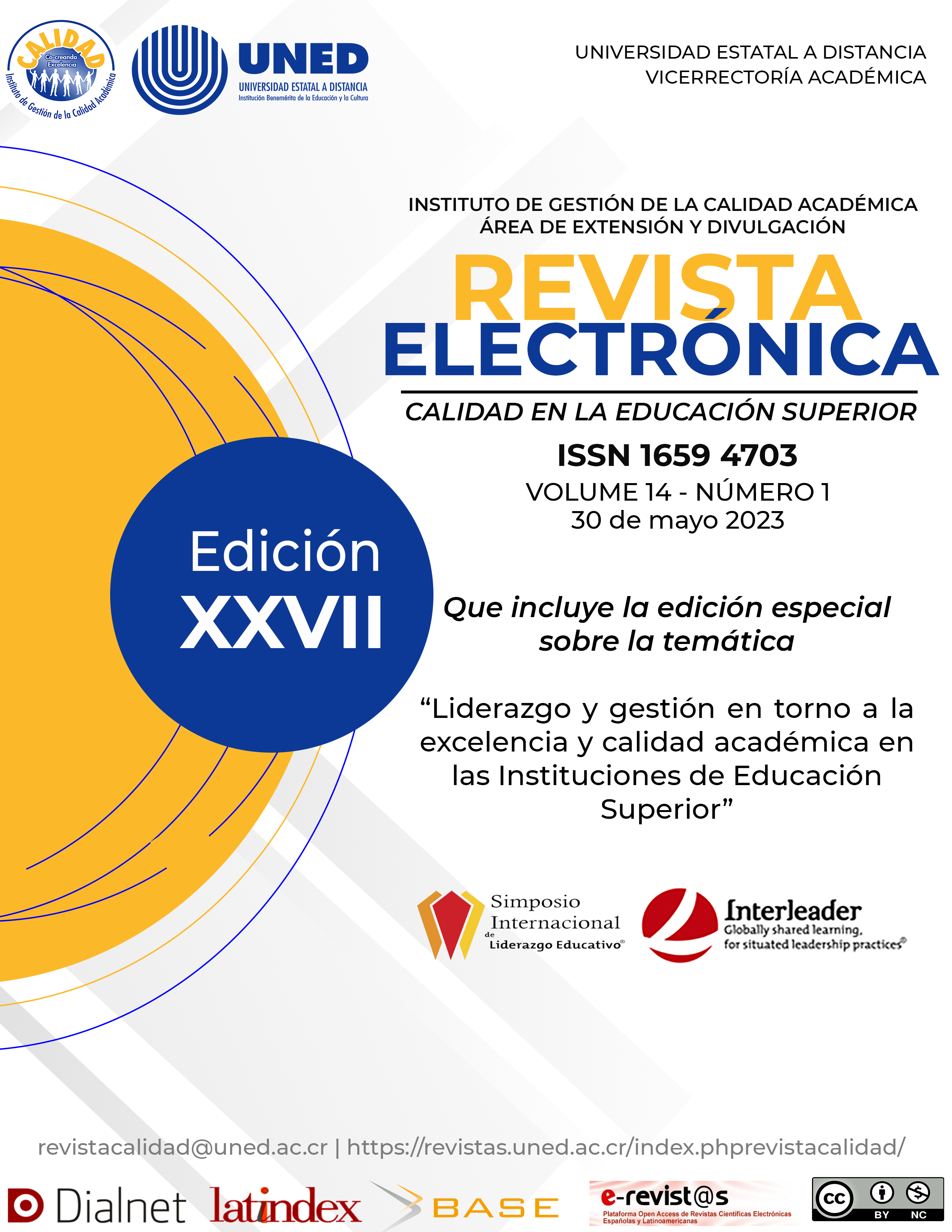Managing higher education in unstable environments: Organizational challenges
DOI:
https://doi.org/10.22458/caes.v14i1.4688Keywords:
Higher education, Education Management., Unstable environmentsAbstract
El objetivo de este estudio es revisar la literatura sobre los desafíos organizacionales de la dirección estratégica en la educación superior ante un entorno de cambio constante. El estudio se desarrolla con motivo de una revisión narrativa de la literatura. Se concluye, en particular, que el entorno cambiante, como el actual, revela nuevos y viejos desafíos a la educación superior, por lo que la supervivencia y el desarrollo futuro de las Instituciones de Educación Superior dependerán de su buena adaptación. Surge como un desafío brindar experiencias de aprendizaje significativas a los estudiantes, utilizando las redes sociales desde una perspectiva profesional.
References
Aerts, G., Cauwelier, K., Pape, S., Jacobs, S., y Vanhondeghem, S. (2022). An inside-out perspective on stakeholder management in university technology transfer offices. Technological Forecasting & Social Change, 175(2022), 1-18. https://doi.org/10.1016/j.techfore.2021.121291.
Alam, M. G., y Parvin, M. (2021). Can online higher education be an active agent for change? Comparison of academic success and job-readiness before and during COVID-19. Technological Forecasting Social Change, 172(121008), 1-6. https://doi.org/10.1016/j.techfore.2021.121008.
Balarezo, J., y Nielsen, B. B. (2017). Scenario planning as organizational intervention: an integrative framework and future research directions. Review of International Business and Strategy, 27(1), 2-52. https://doi.org/10.1108/RIBS-09-2016-0049.
Batista, L. S., y Kumada, K. M. O. (2021). Análise metodológica sobre as diferentes configurações da pesquisa bibliográfica. Rev. Brasileira de Inic. Científica, 8(021029), 1-17. Recuperado de https://periodicoscientificos.itp.ifsp.edu.br/index.php/rbic/article/view/113.
Bourmistrov, A., y Amo, B. W. (2022). Creativity, proactivity, and foresight. Technological Forecasting & Social Change, 174(121215), 1-11. https://doi.org/10.1016/j.techfore.2021.121215.
Cambui, Y. R. S., y Natali, M. R. M. (2015). Doenças inflamatórias intestinais: revisão narrativa da literatura. Revista da Faculdade de Ciências Médicas de Sorocaba, 17(3), 116-119. Recuperado de https://revistas.pucsp.br/index.php/RFCMS/article/view/20378.
Comi, S. L., Argentin, G., Gui, M., Origo, F., y Pagani, L. (2017). Is it the way they use it? Teachers, ICT and student achievement. Economics of Education Review, 56(2017), 24-39. https://doi.org/10.1016/j.econedurev.2016.11.007.
Daniela, L., Kalnia, D., y Raimonds, S. (2017). An overview on effectiveness of technology enhanced learning (TEL). International Journal of Knowledge Society Research, 8(1), 79-91. https://doi.org/doi:10.4018/IJKSR.2017010105.
Donthu, N. (2020). Effects of COVID-19 on business and research. Journal of Business Research, 117(2020), 284-289. https://doi.org/10.1016/j.jbusres.2020.06.008.
Gil, S. K., Dhir, A., Singh, G., y Vrontis, D. (2022). Transformative quality in Higher Education Institutions (HEIs): conceptualisation, scale development and validation. Journal of Business Research, 138(2022), 275-286. https://doi.org/10.1016/j.jbusres.2021.09.029.
Grijalvo, M., Segura, A., y Núñes, Y. (2022). Computer-based business games in higher education: A proposal of a gamified learning framework. Technological Forecasting & Social Change, 178(121597). https://doi.org/10.1016/j.techfore.2022.121597.
Guzman, J. H. E., Zuluaga-Ortiz, R. A., Barrios-Miranda, D. A., y Delahoz-Dominguez, E. J. (2022). Information and Communication Technologies (ICT) in the processes of distribution and use of knowledge in Higher Education Institutions (HEIs). Procedia Computer Science, 198(2022), 644-649. https://doi.org/10.1016/j.procs.2021.12.300.
Imran, S., y Rautiainen, A. (2022). Effects of contextual variables on strategic investment decision-making styles: An empirical study from Pakistan. Asia Pacific Management Review, 27(2022), 1-9. https://doi.org/10.1016/j.apmrv.2021.03.004.
Klofsten, M., Fayolle, A., Guerrero, M., Mian, S., Urbano, D., y Wright, M. (2019). The entrepreneurial university as driver for economic growth and social change-key strategic challenges. Technological Forecasting and Social Change, 141(2019), 149-158. https://doi.org/10.1016/j.techfore.2018.12.004.
Kozlova, D., y Pikhart, M. (2021). The use of ICT in higher education from the perspective of the university students. Procedia Computer Science, 192(2021), 2309–2317. https://doi.org/10.1016/j.procs.2021.08.221.
Kraus, S., Durst, S., Ferreira, J. J., Veiga, P., Kailer, N., y Weinmann, A. (2022). Digital transformation in business and management research: an overview of the current status quo. International Journal of Information Management, 63(102466), 1-18. https://doi.org/10.1016/j.ijinfomgt.2021.102466.
Kraus, S., Jones, P., Kailer, N., Weinmann, A., Chaparro-Banegas, N., y Roig-Tierno, N. (2021). Digital transformation: an overview of the current state of the art of research. Sage Open, 11(3), 1-15. https://doi.org/10.1177/21582440211047576.
Krishnamurthy, S. (2020). The future of business education: a commentary in the shadow of the COVID-19 pandemic. Journal of Business Research, 117(2020), 1-5. https://doi.org/10.1016/j.jbusres.2020.05.034.
Lazetic, P. (2020). Studying similarities and differences in higher education organizations based on their websites - comparative methodological approaches and research potential. International Journal of Social Research Methodology, 23(1), 75-90. http://dx.doi.org/10.1080/13645579.2019.1672286.
Lopez-Carril, S., Alguacil, M., y Anagnostopoulos, C. (2022). LinkedIn in sport management education: Developing the students’ professional profile boosting the teaching-learning process. The International Journal of Management Education, 20(100611), 1-13. https://doi.org/10.1016/j.ijme.2022.100611.
Mahapatra, G. P., y Dash, S. (2022). Talent development in a changing world of work. IIMB Management Review, 1(2022), 1-9. https://doi.org/10.1016/j.iimb.2022.03.002.
Mandić, M., Konjović, Z., y Ivanović, M. (2016). Platform for computer-aided harmonization of informatics curricula. Acta Polytechnica Hungarica, 13(3), 159-179. https://doi.org/10.12700/APH.13.3.2016.3.9.
Ribeiro, J. L. P. (2014). Revisão de investigação e evidência científica. Psicologia, Saúde & Doenças, 15(3), 671-682. http://dx.doi.org/10.15309/14psd150309.
Rother E. T. (2007). Revisão sistemática x revisão narrativa. Acta Paulista de Enfermagem, 20(2), 1-6. https://doi.org/10.1590/S0103-21002007000200001.
Sabaityte, J., Davidaviciene, V., y Karpoviciute, R. (2020). Learning skills for enhancing the use of big data. World Journal on Educational Technology: Current Issues, 12(1), 23-36. https://doi.org/10.18844/wjet.v12i1.4438.
Schaedler, L., Graf-Vlachy, L., y Konig, A. (2022). Strategic leadership in organizational crises: a review and research agenda. Long Range Planning, 55(102156), 1-28. https://doi.org/10.1016/j.lrp.2021.102156.
Sousa, L. M. M., Firmino, C. F., Marques-Vieira, C. M. A., Severino, S. S. P., y Pestana, H. C. F. C. (2018). Revisões da literatura científica: tipos, métodos e aplicações em enfermagem. Revista Portuguesa de Enfermagem de Reabilitação, 1(1), 45-54. https://doi.org/10.33194/rper.2018.v1.n1.07.4391.
Vecchiato, R. (2015). Creating value through foresight: first mover advantages and strategic agility. Technological Forecasting and Social Change, 101(2015), 25-36. https://doi.org/10.1016/j.techfore.2014.08.016.
Zhang, K., y Aslan, A. B. (2021). AI technologies for education: recent research & future directions. Computers and Education: Artificial Intelligence, 2(100025), 1-11. https://doi.org/10.1016/j.caeai.2021.100025.
Downloads
Published
How to Cite
Issue
Section
License
Copyright (c) 2023 Revista Electrónica Calidad en la Educación Superior

This work is licensed under a Creative Commons Attribution-NonCommercial 4.0 International License.
Esta revista provee acceso libre inmediato a su contenido bajo el principio de que hacer disponible gratuitamente la investigación al publico, lo cual fomenta un mayor intercambio de conocimiento global.
